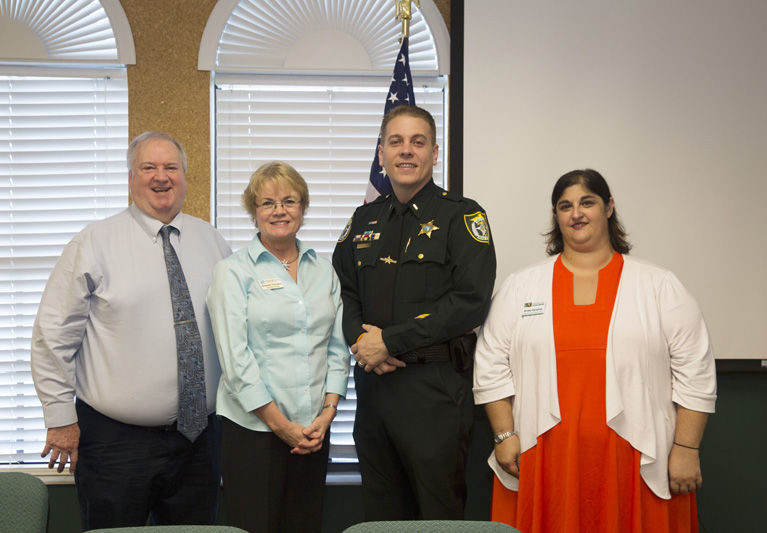
In recognition of September as Hunger Action Month, the Treasure Coast Food Bank hosted a panel discussion last Thursday morning on “Hidden in Plain Sight: Lifting Up Vulnerable Populations in Indian River County.”
Held at the United Way of Indian River County, the panel included Krista Garofalo, TCFB chief strategy and advocacy officer; Michael Kint, United Way CEO; Elizabeth Thomason, Boys and Girls Clubs of IRC executive director; and Lt. Eric Flowers, IRC Sheriff’s Office public affairs officer. The discussion was moderated by David Vaina, TCFB director of marketing, communications and brand strategy.
In answer to a question on how poverty is impacting children and adults, Garofalo said that a lot of people in the community are struggling, with many working multiple jobs just to make ends meet.
“We try very hard to bridge the gap,” said Garofalo, citing the physical, emotional and psychological impact that hunger and poverty can have on families.
Flowers related that the Sheriff’s Office sees the effects of poverty on a daily basis – from schools, where a distressing number of students are homeless, to the county jail, which sees a marked increase in incarcerations during economic downturns.
“I’m looking at poverty from a child’s perspective,” said Thomason, noting that of the 720 children enrolled in the Boys and Girls Clubs’ after-school program last year, 82 percent are eligible for free/reduced lunch and 40 percent of families have annual incomes below $20,000.
She cited some statistics from the Annie E. Casey Foundation, in which Florida was ranked 40th for child wellbeing, 44th for economic wellbeing, 39th for education, 47th for health and 35th for family and community. Statistics for Indian River County indicate that 58 percent of children under 18 were living in poverty in 2013.
“Poverty, and even those not technically impoverished by the federal standards, cuts across everything,” said Kint, who shared information about the ALICE (Asset Limited, Income Constrained, Employed) population. “The formula that the federal government uses to calculate poverty is ridiculous. Anyone who works in the health and human services sector knows that it’s just antiquated.”
Kint said that in addition to the 14 percent of local families living below the federal level of $23,050, another 30 percent have a household income below the ALICE survival threshold of $48,323 for a family of four, leaving little to offset key expenses every family has, such as childcare, healthcare, transportation, food and housing.
“A huge percentage of our county’s population is impacted by financial need. We’re talking about a lot of people,” said Kint. “We tend sometimes to focus on those in poverty and there are a lot of programs that serve them. To be honest, most of the families United Way serves are those families in the ALICE population. We’re trying to help them from slipping into poverty. When we really look at the need, it’s significant.”
In answer to the question posed about strategies in Indian River County that are working, Kint said that while the United Way is not traditionally a service provider, they do offer a few programs to those who qualify, including free tax-return assistance and FamilyWize Prescription Drug Discount Cards, and they partner with other agency groups, such as the Mental Health Collaborative and the Kindergarten Readiness Collaborative.
Thomason said that another positive community initiative is the Moonshot Moment – getting children reading proficiently by third grade, as is the school district’s Career and Technical Education program, which provides high school students with alternative paths after graduation.
“We’ve got an amazing community here; we need to continue pushing in the direction we’re going,” said Flowers, who has been impressed with what our local Veterans Council is doing to help meet the demands of impoverished veterans through its Upward American Veterans initiative, and the free transportation provided by the county through the GoLine. But he also noted that while the various nonprofit agencies are doing great work, demand continues to outpace services.
Garofalo said the TCFB outreach programs are doing well, helping those unable to access or enroll in the various programs available to them. It’s particularly valuable for people who are employed and can’t get to agencies during regular working hours. Their Mobile Food Pantry travels monthly to communities such as Fellsmere, where they distribute fresh and canned foods as well as essential nonfood items and even pet food.
Most were conflicted by the question of whether raising the minimum wage would help alleviate poverty, with each citing arguments on both sides, before agreeing that something needs to be done.
When asked what private citizens can do to help, they suggested everyone can help through volunteerism, monetary contributions and/or advocacy.



